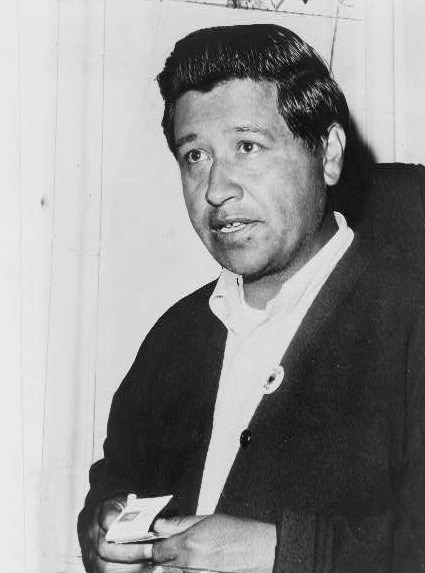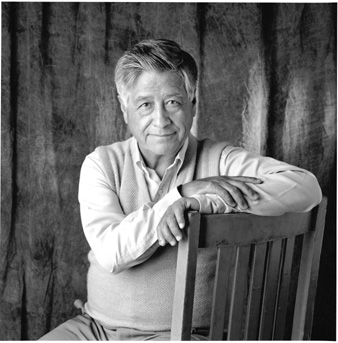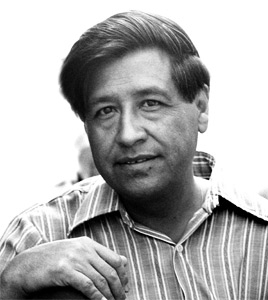 |
| Cesar Chavez talking |
My hero is Cesar Chavez because he was helping immigrant workers. He was a Mexican- American laborer and a leader of the United Farm Workers. Even though I didn’t see him on TV, the newspaper or anywhere, he is still my hero. My brother did a report on him once, and I helped my brother find a person who helped and fought. I first thought that was my hero.
Cesar Chavez had a poor family. Cesar had to go to many different schools, because his parents couldn’t pay the farm and didn’t have money. They had to go throughout California and other places. Cesar did want to finish grammar school, but he also wanted to work with his dad in the fields. Cesar quit grammar school.
Cesar grew up working in the fields, since he was little. Cesar began a strike to help the immigrant workers get more money. Immigrant workers like Cesar got paid less than the minimum wage. They were paid only 1 to 5 dollars every hour. That’s when Chavez started to get mad, saying that we should all be paid the same. It was not fair that the immigrant workers work for 24 hours and they got paid only 1 dollar every hour. The strike lasted for about 5 years. Chavez was working hard to get them to pay them more. Chavez went to California, and he made speeches to support the workers rights. Cesar struggled to improve the working conditions of the farm workers.
Chavez was willing to sacrifice his own life so that the union would continue. The strike was on and there was yelling, marches and boycotts. Chavez passion was to focus national attention on these laborers, terrible working conditions, which eventually led to improvements. Cesar kicked off the Grapes of Wrath campaign to draw attention to the pesticide poisoning of the farm workers. Then Cesar became a CSO director, and moved to its headquarters in Los Angeles.
 |
| Cesar Chavez ((google)) |
Cesar led a national boycott of California, which became known as “La Causa” (the cause). By the end of the boycott, in 1970, 17 million Americans supported it, including many political and civil rights leaders. Robert Kennedy was particularly strong supporter. Cesar got an award, the Aztec Eagle Mexico’s highest award presented by the Mexican Heritage Foundation. California established a state holiday on Chavez’s birthday to honor him.
Cesar had to help the immigrant workers. Cesar Chavez died in his sleep peacefully and quietly. There were more than a thousand people at his funeral honoring him and the United Farm Workers and the CSO.
 |
| Cesar Chavez |
Cesar Chavez
We see him speaking to the
Immigrant workers.
People yelling people screaming.
Hearing the deep voice
Of Cesar Chavez.
Working in the fields everyday,
Making good improvements.
Traveling place to place
Reaching for a goal.
Seeing pictures of him.
Touching the palm of his hand.
Smelling the good corn and grapes.
Cesar Chavez Timeline
March 31 1927 Cesar Estrada Chavez was born in Yuma Arizona to a poor Mexican American family.
1937 Chavez’s parents lose the farm and family business in the depression. The family joins the thousands of migrant farm workers toiling in the California fields.
1938 Chavez’s family moves to California working as farm labors.
1942 After graduating from the 8th grade, Chavez becomes a full tine ferm worker to help support his family.
1944 Chavez challenges segregation (white vs. Mexican) and refuses to sit in the Mexican section of the theater he is in custody for an hour.
1944-1946 Chavez fought in World War 2 in the US Navy.
1948 Chavez and Helen Fabela are married.
1952 Chavez joins the CSO in San Jose California, a voter registration drive.
1959-1962 Organizes support from farm workers throughout California’s San Joaquin valley forming the National Farm Workers Association (NFWA).
September 30 1965 NFWA rallies it’s membership to strike against grape growers in Delano California.
1968 Chavez leads a national boycott of California table grape growers which becomes known as “La Causa” (the cause). By the end of the boycott in 1970, 17 million Americans supported it including many political and civil rights leader. Robert Kennedy was a particularly strong supporter.
1969-1970 under pressure from the national boycott grape growers are forced to sign UFWOC contracts. The strike ends July 29 1970.
1975 Cesar get the land mark Agricultural Labor Relations Act passed through the California State Legislature.
1986 Cesar kicks off the grape of wrath campaign to draw attention to the pesticide poisoning of the farm workers.
1991 Completes a speaking tour of colleges to provide information about the UFWS boycott of California table grapes.
1993 Cesar Chavez dies in his sleep peacefully on April 23 in San Luis Arizona.
August 23 1994 President Bill Clinton presents the medal of freedom Americans highest civilian honor to Cesar Chavez. The award was accepted by Cesar’s widow.
2000 California establishes a state holiday on Chavez’s b-day to honor him.
Page created on 6/3/2007 12:00:00 AM
Last edited 6/3/2007 12:00:00 AM
